Open Minds
 12.14.2012
12.14.2012
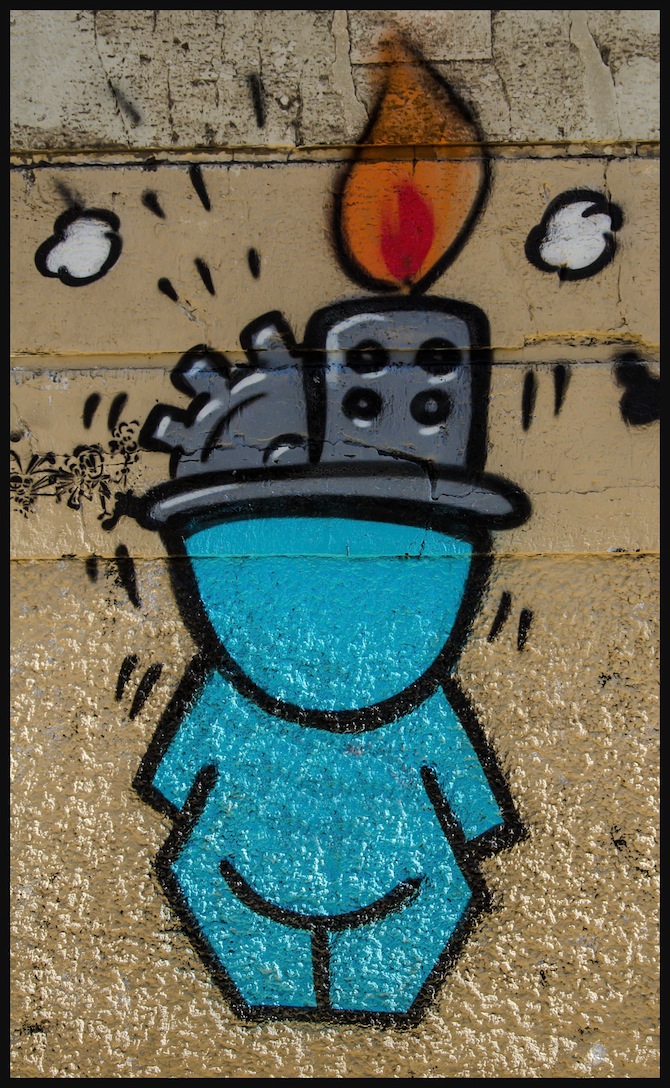
I was full of inspiration after the evening panel discussion by French, British and American literary magazine editors at Shakespeare and Company Books. I wanted to get home quickly to open my new books (Giovanni’s Room! The Stockholm Octavo! The Tenants of The Hôtel Biron! Londoners! Tin House’s issue on Beauty!). But I was hungry. I took a short detour down one of those twisty golden Paris streets to a little Italian trattoria with phenomenally tasty pizza.
The small black-haired Italian girl behind the counter was talking with the older Italian customer just as if the scene were frozen since the last and only time Richard and I had stopped there.
The Italian man asked where Richard and I lived. Paris, now. And where did you live before? said the girl. Playa del Rey, a beach town in Los Angeles, I said. The Italian girl wanted to know why we’d rather live in Paris. The older man laughed. He knew. He moved to Paris from Bari some thirty years ago.
My pizza was ready. There was a booth at the back, near two women who were belting down red wine.
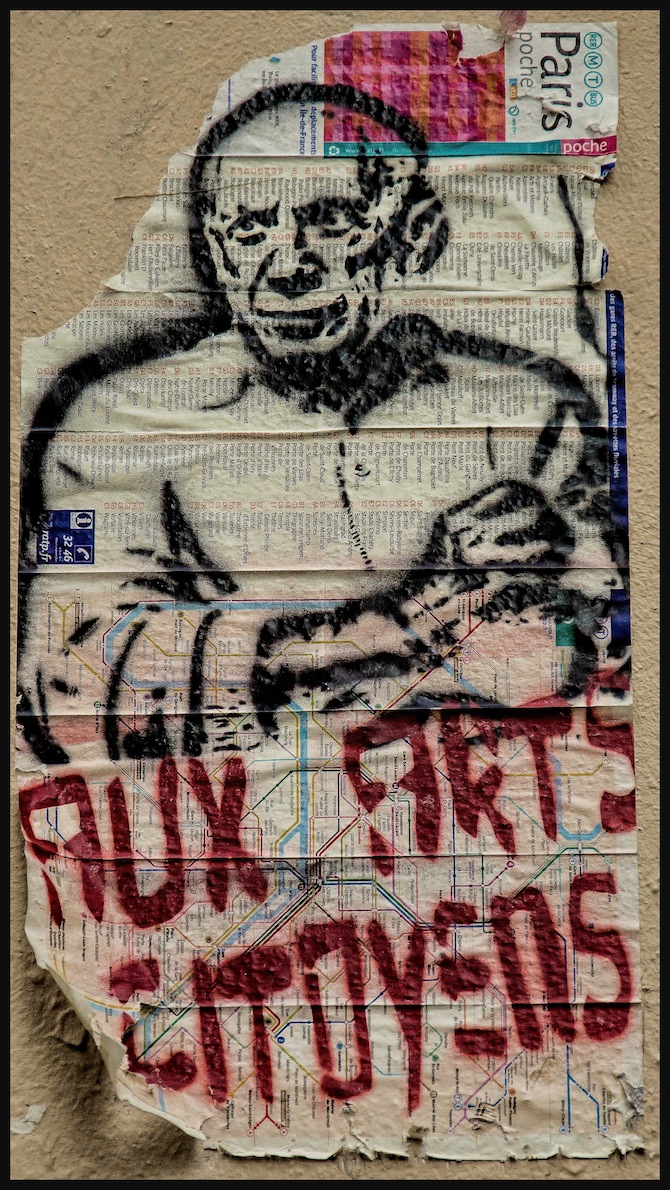
I opened my book, The Tenants of The Hôtel Biron. It’s a fictional account of the years when the house that is now the Musée Rodin was inhabited by Pablo Picasso, Henri Matisse, Rainer Maria Rilke, Auguste Rodin, Camille Claudel, Vaslav Nijinsky, Eric Satie and Jean Cocteau. I know, you want to read it, too, right? I read with special relish because the author, Laura Marello, had passed the manuscript to me about ten years ago when we knew each other in Los Angeles. I’d been knocked out by the story and the writing, felt it was publication-worthy then, and now, ten years later it had found its publisher, Guernica Editions. Do you have any idea how happy it makes me when a writer finally breaks through?
So I’m savoring the pizza, devouring the book, and the two women speaking Spanish behind me are growing boisterous with gaiety. One taps me on the shoulder and asks in French if I have a cigarette.
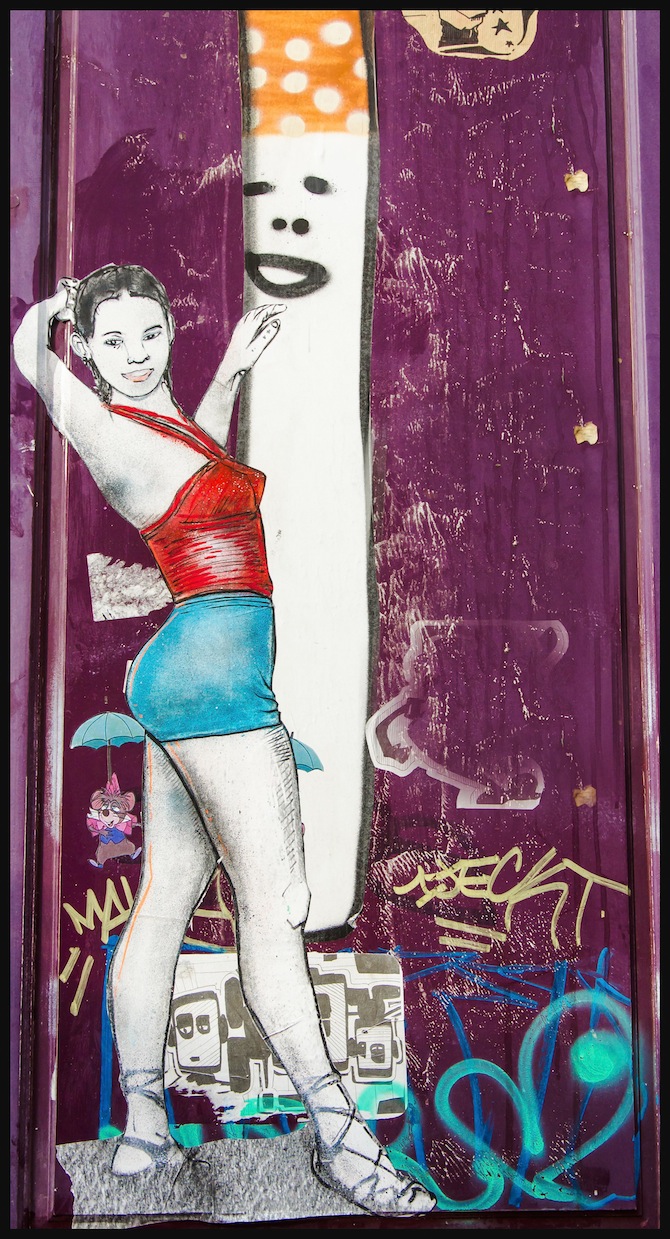
Non, je suis désolé, je ne fume pas.
She gets up to ask the only other diner, a man who looks like Serge Gainsbourg, for a smoke. He hesitates, gives her one, and she puts it in her mouth as if she’s lighting up.
You know it’s not legal to smoke in restaurants? I ask.
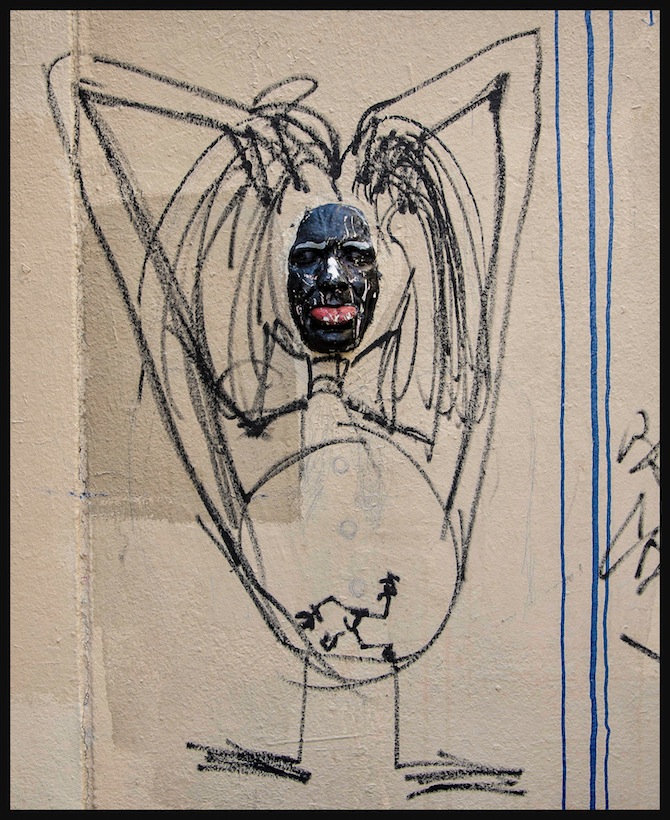 Street art (mask) by Gregos, additional artist unknown
Street art (mask) by Gregos, additional artist unknown
She scurries over to the edge of my booth and leans in and makes a face at me. Then walks outside to smoke.
Her friend behind me says, Forgive her. She doesn’t understand that you have to respect the cultural customs of the country in which you live. She has a problem with depression.
It’s okay, I say. For me it’s just a matter of health. I’m so relieved that France changed its laws about smoking in restaurants.
The woman and I banter in French. She tells me she talks to her friend about her surly attitude.
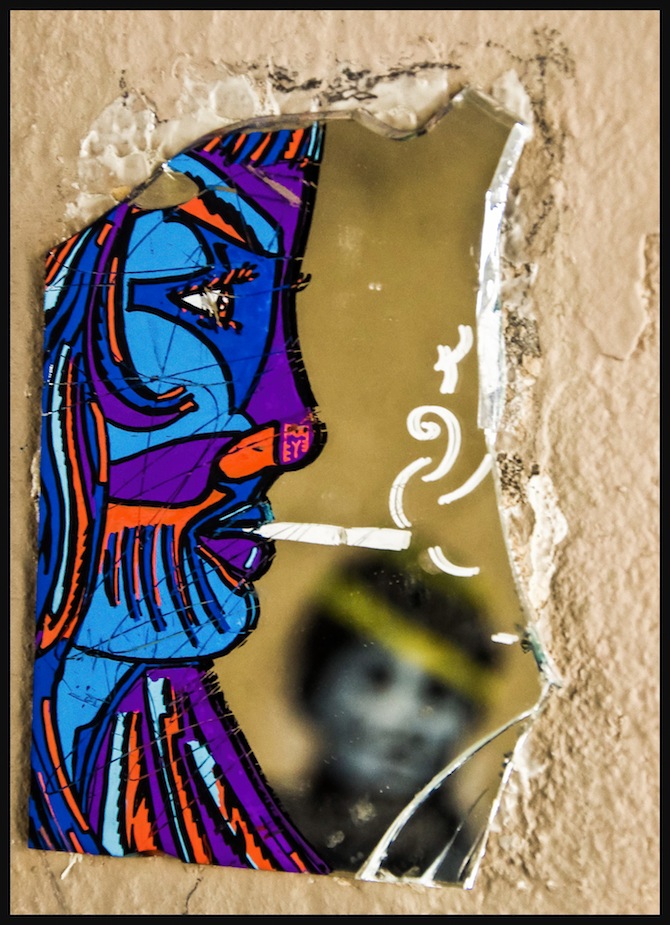 Street art by PopEye
Street art by PopEye
The smoker returns. She sits down, her back to my back but turns to look at me as I talk with her friend. She is drunk, with a sweetly cow-like expression on her face, melancholy eyes, and a sprinkling of freckles. Like her friend, she has very short hair.
We ask questions of each other. Discover we are from the same continent, only they are from South America.
It’s the continent of the heart, I say.
South America, maybe, says the older woman.
North America too, I say. It’s all one heart.
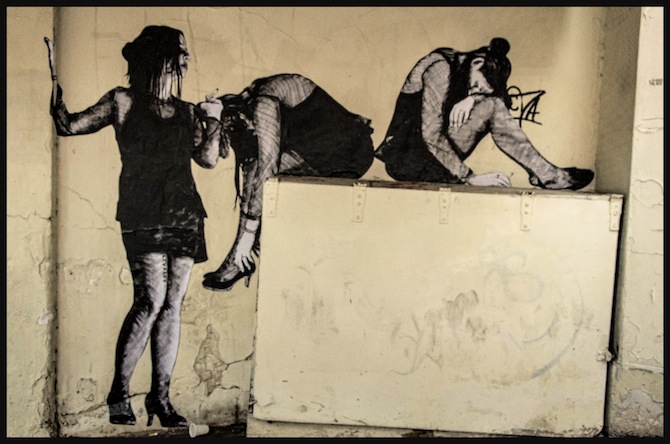
Then an odd conversation begins. The older woman begins to talk about her friend as if she isn’t there. She is too closed, she says. She stays at home and is depressed. She doesn’t have any confidence in herself.
The younger woman nods, That’s right.
The older woman says, We’re out tonight trying to cheer her up. Getting her out of her apartment. Having a little wine.
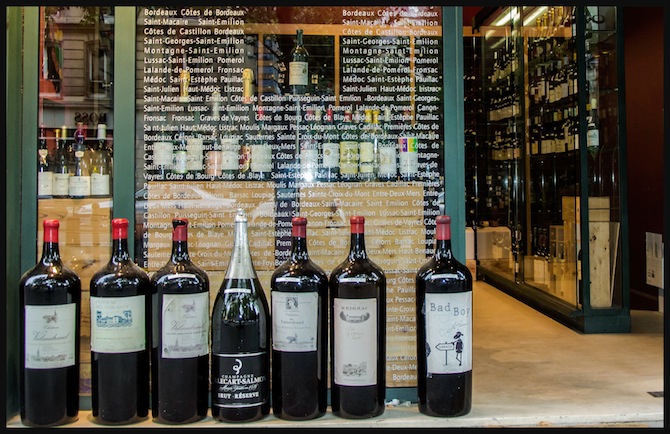
There are four empty bottles on the table.
We talk about living in Paris. I notice that the younger woman’s fluency in French, her accent too, is excellent, and ask her about it. She was educated in Paris.
The older woman is originally Basque—we have rebellion in our veins, she says. Her family emigrated to South America before she moved to Paris. She never wants to leave.
The younger woman asks me if I’ve read Stefan Zweig.
No, I say. Is he good?
Very good, she says.
Do you like Proust? I ask.
The two women shake their heads. There are certain moral problems it seems with Proust. (Do they mean that he was gay?)
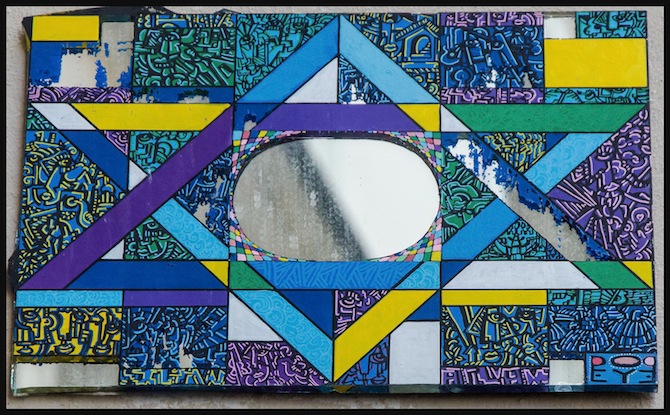 Street art by PopEye
Street art by PopEye
He was Jewish, wasn’t he? the older woman asks.
Half Jewish, half Catholic, I say. He was raised as a Catholic, but really identified more with his mother who was Jewish.
I can see in their faces that there’s some difficulty in the way they regard this fact.
But you can’t be two religions, says the older woman.
Well, God, gods, spirits—what difference does it make?
They look at each other meaningfully. (Unspoken: a huge difference.)
You are Catholic? I ask.
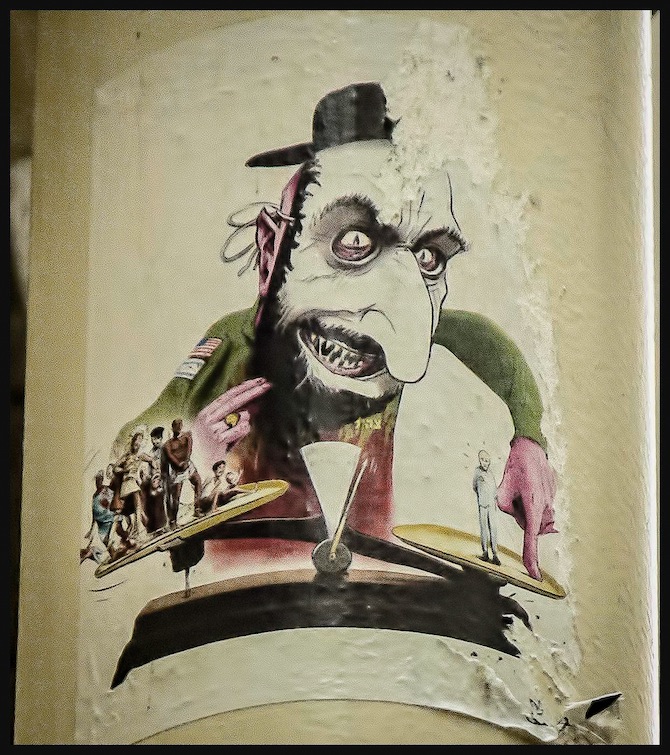 Anti-Israel/-American street art in the Marais, artist unknown
Anti-Israel/-American street art in the Marais, artist unknown
They both nod as if to say, Exactly. And then the older woman, her lips red with wine, begins to talk about Jews. How grasping they are. How they try to take over the banks.
No, no, no, I say.
How Hitler tried to save his country from the Jews.
Hitler was a monster! I say.
No, he was trying to save his country.
The Jews were not responsible for the wretched state of Germany after World War I, I say. Germany was economically ruined and Hitler offered a scapegoat, someone to blame. He was a failed artist, a maniac.
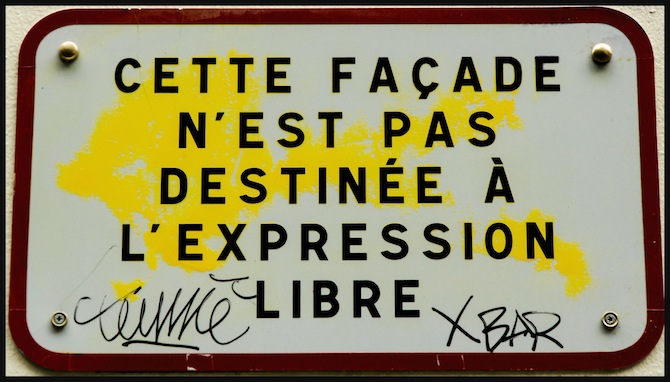
I suddenly see that a visor-like armor has fallen over their faces. There is no further place to go in conversation with these two. Closed minds. Time to go. I pack up my book bag and say goodbye.
And the Italian man who still stands talking to the girl behind the counter, says, Dites bonjour à votre mari. Say hello to your husband.
Merci. Et bonne nuit à vous.
Buona notte, says the girl with a big smile. California, she sighs.
I walk home thinking about bigotry and hatred. How an atheist Jewish friend of mine used to talk about Catholics, and mock my spirit helpers, who appear to me in the form of gods and goddesses. She is someone I love, but it cost the friendship. No one wants to have to defend his or her own spiritual beliefs, nor should any of us have to.

I think about how a recent online discussion of a well-known Native-American poet’s reading in Tel Aviv elicited a furor on Facebook. There were those who, objecting to Israeli bullying of Palestinians, said, Don’t cross the picket line. There were those who defended Israel at any cost. There were those who sent her love and blessings on her performance there in the role of poet and musician.
I identified, in some way, with all of them.
It’s so obvious. Peace and love are not clichés. They’re the answer. But when you encounter scapegoating and bullying, where do you draw the line?



Reader Comments (11)
It is so easy for people to disguise themselves on the surface (having masked their truth from themselves forever) until their armor is pierced by a topic they cannot hide from. Add several bottles of wine and their true colors emerge.
Draw the line at even a hint of bigotry and hate, and walk away. Your energy is too precious to try to change their rigid beliefs. Bow gracefully and be glad to escape.
XO,
Joanne
I empathize with these kinds of people for the state they live in. Surely this is purgatory....
Dear Joanne,
This is insightful and wise. My experience of closed minds is: they are closed because their owners feel inferior and insignificant. Their only way of getting a sense of power is to imagine they are above some other "inferior" group. It's phony power, but if you don't delve too deeply into your own psyche, phony power might convince you, might seem to be the only possibility. The last thing these people are willing to hear is a challenge to their only source of a sense of worthiness.
I feel empathy to a certain extent, but also know how damaging such scapegoating can be. It's the saddest thing that humans do, to choose inflicting damage over being creative. But it's been going on forever.
Thank you for your wisdom and your open heart.
Much love,
Kaaren & Richard
Where do you draw the line?
Good question.
You gather your things together and you walk out.
But what I want you to do, Kaaren, just between you and me, is to write out a parting speech to them or for them.
I want to hear this from you, because the line must be drawn so those folks know it is being drawn and why and what it is. They have spoken out loud.
Here's my drawing of the line. .
"I am going to go now. And I want you to know why I am leaving you. For I am not just going. I am leaving you. And, without insulting you, I want you to know why I am leaving you.
I am leaving you because you have erected a wall of absolute opinion between us. It feels like there is no speaking to you further, therefore. And it is not the question of the Jews and Hitler, and so forth, no. It is a question of the tendency in you to harden opinion inside yourselves and your hearts and your minds. Hard as metal.
And how does it become hardened?
It becomes hardened because of a tendency in you to draw conclusions before you are fully informed. Before you have examined the other side or sides of a matter. If you had examined all the sides of the question you would not emit the impossibility of human conversation with you.
I am leaving because you have already left. I am leaving because your own natural intelligence is not present to engage with. It is walled up. It has made human communication with you mute, stony, and dead. You have done this.
I say this because I don't want you to be this way. I can't stay and wait for you to change. Bigoted people have to exist, I suppose, just as gangsters do. But I wish you would change. I wish the two of you would just try it out, just try exploring, by reading or watching or talking or listening, to an opposite view of a matter on which you are absolute.
Just try. As an experiment.
What harm could come to you?
See what you get, huh?"
Love you,
Bruce
[Submitted by Bruce Moody by e-mail; posted by KK & RB]
Dear Bruce,
Thank you for this eloquent and accurate description of what has happened inside the minds of bigots. I do understand exactly that about this close-mindedness. I have in the past spoken up to bigotry, many times. What I have learned is: it is not heard. It is not received. It does no good.
Speaking it, that is. However, I think the written mirror of this kind of mindset and speech can sometimes get through. Simply mirroring it back to them. It looks ugly when it's presented dispassionately. Just ugly. Mean-spirited. Sorrowful. Whereas if you engage in a dialogue with someone engaged in scapegoating, it can be heard as simply a personal philosophical difference. The detachment of the written perspective (as much as detachment is ever possible), is easier to hear. It cuts below personalities. Or so I believe.
Though dialogue IS always a good idea between open minds.
We're grateful to you for stepping up to the challenge of the question: where do you draw the line? And we'd love to hear others' thoughts and experience on the matter.
Love,
Kaaren & Richard
Kaaren, I so agree with you about how such people (and zillions like them in various ways) have a distorted way of resourcing their sense of who they are. They do feel inferior but have no courage to even look at this "face" in their mirrors of life - interactions with others. Disguise is safety. These people become vampires and feed upon negativity and drink from others' energy gaining momentary false power by making others wrong. Bigotry and hatred emerge from here. This is not sustainable so is repeated.
Closed minds = closed hearts. Open hearts create expansive energy that replenishes. We can't change a mind that is closed or force consciousness on anyone. Non-reaction at least does not feed their need for negative energy in return. Our world has inhabitants who are on vastly different paths of development. This saying works for me here: "But for the grace of God, there go I." We have all tread the path of growth over the eons. These kinds of people are a reminder of how far some have come and how far others have to go.
XO,
Joanne
Dear Joanne,
Yes! I've often noticed that metaphor of vampire with negative people. I approach others with openness, and it is very very difficult for me to give up on anyone. I used to try to create dialogue and understanding even when people are expressing beliefs that are loathsome to me. Used to. I discovered exactly what you're describing. There are many stages of evolution, and those who want to evolve do, those who don't, don't. And you DO just feed the negative energy if you engage it. I've now learned that if I leave a get-together with someone and find myself drained, disheartened and at a much lower level of energy than when I came to meet them, if I have this experience three times, I have to let the relationship go. Even if I love the person. We just don't have infinite time and energy to waste. "There but for the grace of God, go I."-- that sounds like your way of seeing the world, through the eyes of compassion.
Here's a quote I love: Oliver Wendell Holmes, Sr. described bigotry in this way: "The mind of a bigot is like the pupil of the eye; the more light you pour upon it, the more it will contract."
Love,
Kaaren & Richard
What a great quote by Oliver Wendell Holmes, Sr, Kaaren. And so true. I love each of your wise and astute friends’ comments.
This exchange in the pizzaria was a powerful one, one that showed two sides so clearly. You were so caught off guard, immersed in a positive sensory experience of fine books and food. And those two women -- toxic, dark, done-to, heavy--seemingly wanting to infect something or someone. How I admire you -- speaking the truth, knowing the limits of these women, and moving on with grace (and might I add, the writing here is full of tension and dread…)
I know how much an exchange like this can affect someone. It reminded me of an experience I had eight years ago. I had been in a minor-but-scary car accident and was new in town; my car had to be towed and I had no ride back home. My husband was away and there was nobody I knew to contact. He called a friend of his (also out of town) who asked a local friend to help me out, and he drove to the scene within minutes.
I knew little about this guy ; I’d only met him once before, very briefly, and didn’t like him (I have since realized that I have super intuition—but back then, I did not listen to / believe it). So, I got in the car with him.
It was only a short ride to my home, but through small-talk, he asked where I was from (Maine). Out of nowhere, he asked, with great conviction, “There aren’t any black people there, are there? In Maine?”
Odd thing to bring up, I thought, but I confirmed the fact that no, there weren’t.
He went on about how he felt about African American men, about how if he were a father (he wasn’t a father, thank GOD, and let’s hope it’s still that way) he would disown his daughter if she, “brought home a black guy—because it is the worst thing she could ever do to [him].”
It was like I had accidentally turned on the radio and tuned in to the middle of a rant on a bigot-only station. I was stunned silent. He may have gone on for a few more moments, but I was overwhelmed with a sense of fear and sickness. He dropped me at my doorstep and I actually thanked him (!! WHY did I do that??) for the ride. I was sick, angry, and couldn’t do anything with all those ugly feelings about him. Why hadn’t I stood up and said he was wrong? It still upsets me... that I didn’t say anything, that he felt I was an opportunity to cover me in his poison. Looking back, though, I believe I knew what I was up against: an impermeable rock.
I can smell a mean person immediately; I’ve gotten very good at it through the years. But the toxic bigots, though, they still sometimes surprise me, walking around, disguised as human.
Jennifer!
Thank you from all of us. And thank you for that vivid story.
Isn't that just the way it is? You know something essential about someone through instinct and intuition, but it takes a while to trust that. I knew who this woman was the instant she made a face at me. Later she was sweet in conversation, but the minute the disguise was dropped, she was hard. You knew the minute you met this guy who he was, and later he proved it.
The same words keep coming up for this kind of mind-set: armor, rigid, visor, metal, hard, stony, dead, walled up, closed, contraction. The opposite of tender, vulnerable, compassionate, human.
And the same words keep coming up for its effect on others: vampire, toxic, poison, sick, disheartened, drained, dark, done to, heavy, negative, waste, angry, ugly. The opposite of light-giving, life-giving, blessing.
OF COURSE you didn't speak up to this guy. You were at his mercy, in his car, new in town, your husband out of town. This is just the kind of guy who can get violent.
And of course you thanked him for the ride. That's who you are.
But as a writer, you can write about this way of [not] being human. Better than speaking up to one person who's deaf anyway.
Thank you for telling a story I will remember.
Much love,
Kaaren & Richard
Thank you for responding so thoughtfully to my post. Thank you for writing about -- and illustrating -- the things that matter. You both inspire me.
xo
K & R,
This is a timely subject with the Mayan prophecies, which, from sources I respect say is a window for mankind to potentially evolve into a greater awareness of Brother/Sister/Godhood. In other words, unity, inclusiveness, which imply kind, generous behaviors for the benefit of self and others.
Recently, I've come to simplify my way of measuring where I prefer to be, which is alluded to in comments above. I ask, 'Did this interaction drain me or empower me?" I too, recently used the strike three approach and in some situations my umpire says, "Strike one. Out now!" Some lower vibrations are instantly recognizable from past exposure.
People who are willing to impair their health with substance abuse, like alcohol and cigarettes won't get an ounce of my blood, to use the vampire metaphor. They're flagrantly, obviously trying to cover some pain, which inevitably seeks an external place or person to spew on. I've found that spewing behavior is cyclical.
Bigotry is a doozy because it so often leads to fatal violence. It has its various grades from psychological violence on up. My experience with psychological violence is that its subtle nuances can be more easily overlooked. That's why the drain vs. empowerment barometer works for me. My normal, or usual state of being is a peaceful flow. When that's been ruffled I immediately investigate. The more subtle ripples can come from a "friend" who suddenly exerts a lot of energy trying to convince me to think or believe as they do, concludes an untrue or limited perception of me, discounts with sarcasm, projects failure, falsely accuses, blames, dredges up my past lessons/stories.
Lately, I'm grateful for an objective approach which I used to think was arrogant, due to societal conditioning, but have changed my view about. I trust that mutually kind interactions are of the highest vibration. I love all equally, yet accept that some are of a low reptilian level of evolution.
Kaaren, your comment, "... if you don't delve too deeply into your own psyche, phony power might convince you, might seem to be the only possibility." is of utmost importance and useful to me. In meditation and in journaling is where I do the important weeding of that which I choose to reject or accept into my consciousness. As my cute mom says, "Don't buy into the voodoo."
Also, it comes to mind that your gift of conveying without saying a word, is a powerful tool, as are your photos Richard. A great master teacher taught me that in some situations it's best to send the thought. Then, there are some souls who are attempting to reach to a higher ground and may touch to an uplifted vibration, for a time, then back off, then return. Each at his/her own pace.
For me, the results of this proactive examining are continuity of peace, health and joy.
Love,
Marguerite
Dear Marguerite,
Aside from a hearty Amen! I'd respond, Yes, sometimes once is enough for your inner umpire (that's a good metaphor you offer). And, psychological violence without physical acting out IS the hardest to see clearly. I guess it's a question of coming to trust your intuition. If you think "friends" are acting out of jealousy or competition or aggression, and you keep getting this impression, it's usually correct. How can you tell the difference between a good dialogue, and argument or comments that come from bitterness in the other person? By how it makes you feel. We have superfine systems of reading others, don't we? Now to trust them and get on with the work and love that matters.
Much love to you,
Kaaren & Richard